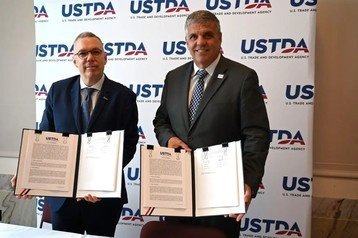AFR-IX Telecom Wins USTDA Grant for Medusa Subsea Cable to West Africa

▼ Summary
– The USTDA is funding a feasibility study for AFR-IX Telecom to extend the Medusa subsea cable from the Mediterranean to Africa’s Atlantic coast.
– The study will evaluate the technical and commercial viability of the expansion to enhance digital infrastructure in West Africa.
– The expansion would build on the existing 8,700 km Medusa network, which connects Portugal to Egypt via multiple countries with a capacity of 20 Tbps.
– USTDA’s involvement aims to provide Africa with secure, reliable infrastructure to support future technologies and counter “untrusted providers.”
– The Medusa cable system, also funded by Orange and the EU, is expected to be transformational for digital connectivity and is planned to go live this year.
A major step forward for West Africa’s digital landscape is underway, as AFR-IX Telecom secures a USTDA grant to explore extending the powerful Medusa subsea cable system. This crucial feasibility study, funded by the US Trade and Development Agency, will evaluate the technical and financial viability of stretching the cable’s reach from the Mediterranean down to the Atlantic coastline of Africa. The initiative promises to significantly bolster the region’s internet infrastructure, fostering greater economic and social development.
The exact locations for landing the cable on the Atlantic coast are still under review. However, AFR-IX has existing agreements to land Medusa in Port-Gentil, Gabon, and has also indicated plans for a connection point in the Democratic Republic of Congo. This ambitious expansion would leverage the cable’s existing massive network, which already spans approximately 8,700 kilometers. The current route connects Portugal to Egypt, weaving through Spain, France, Sicily, Greece, Cyprus, and several North African nations, boasting an impressive capacity of 20 Tbps per fiber pair.
Thomas R. Hardy, the Acting Director of USTDA, highlighted the strategic nature of the investment. He stated that subsea cables form the essential backbone for Africa’s digital progression. The agency’s support is designed to promote trusted, secure infrastructure, ensuring the continent can fully leverage advanced technologies like artificial intelligence and next-generation mobile networks, rather than relying on less reliable alternatives.
Echoing this sentiment, Norman Albi, CEO of both AFR-IX and the Medusa project, described the system as transformational. He believes it will unlock unprecedented opportunities for innovation, trade, and greater social inclusion along Africa’s Atlantic coast. The backing from USTDA, he noted, is a critical factor that transforms the ambitious vision into a concrete and financeable project.
The Medusa cable system is a collaborative effort, with funding previously secured from AFR-IX, Orange, and the European Union. The EU alone committed €14.3 million to support the West African expansion phase. Initially announced in 2022, the entire Medusa system is on track to become operational before the end of this year.
(Source: MEA Tech Watch)
